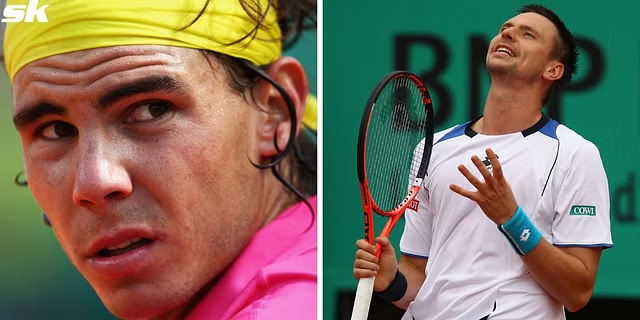“If You Can Win One Set Against Rafael Nadal, Then…”: Norman Reveals Robin Soderling’s Masterplan in Iconic 2009 French Open Clash

The 2009 French Open remains one of the most memorable tournaments in tennis history, thanks to a jaw-dropping upset that few could have foreseen. Robin Soderling, a Swedish player not widely known for upsetting the tennis elite, stunned the world by defeating Rafael Nadal, the undisputed “King of Clay,” in the fourth round of the tournament. Nadal, who had never lost a match at Roland Garros before that day, was in dominant form, having won four consecutive titles from 2005 to 2008. However, Soderling and his coach at the time, Magnus Norman, had developed a carefully crafted plan to pull off what seemed like an impossible task.
Recently, Magnus Norman, Soderling’s coach, shed light on their approach to the match, providing insight into how they tactically prepared to face the clay-court giant. “If you can win one set against Rafael Nadal, then you know you have a chance,” Norman said in a candid interview. This simple yet profound strategy revolved around breaking Nadal’s invincible aura, particularly on the red dirt of Roland Garros, where the Spaniard was seemingly unbeatable.
Norman and Soderling understood that Nadal’s game was built on an unmatched level of consistency, resilience, and mental fortitude, especially on clay. Trying to defeat him over five sets seemed like an insurmountable mountain to climb, but Norman’s strategy focused on narrowing the scope: one set at a time.
One of the key hurdles that Soderling needed to overcome was psychological. Most players who stepped onto the court with Nadal, particularly at Roland Garros, were already defeated in their minds before hitting a single ball. Soderling, however, entered the match with a different mindset. Norman emphasized the importance of not being intimidated by Nadal’s legendary status and aura.
“Robin was fearless,” Norman explained. “We knew that Nadal was the favorite, but we had to focus on Robin’s strengths and take it one set at a time. If you can break his rhythm, even for one set, it starts to plant seeds of doubt.”
Soderling’s game plan was to hit aggressively and take risks. Nadal’s counterpunching style and ability to turn defense into offense were well-known, but Soderling’s relentless pace and depth of shots were designed to disrupt Nadal’s rhythm. He struck his shots with power and precision, keeping Nadal on the defensive for large parts of the match.
Soderling’s serve was also a crucial weapon. He consistently served with precision, taking the ball early to prevent Nadal from getting into his groove. This tactic paid off, as Soderling grabbed the first set, 6-2, a shocking development that left the crowd and Nadal himself in disbelief.
Norman revealed that winning the first set was more than just a statistical advantage; it was a psychological breakthrough. “Once you win that first set, everything changes,” Norman remarked. “Suddenly, Nadal isn’t as untouchable as he seemed before. The pressure is on him to respond, and that opens opportunities.”
Nadal, although the favorite, was not impervious to pressure. After losing the first set, he seemed rattled, and Soderling capitalized on the moment. The Swede continued to dictate the pace of the match, eventually winning in four sets, 6-2, 6-7, 6-4, 7-6, in what remains one of the most stunning upsets in Grand Slam history.
Robin Soderling’s victory over Rafael Nadal in the 2009 French Open did more than just eliminate the defending champion; it marked the first time Nadal had ever lost at Roland Garros. For Soderling, the match became a defining moment in his career, propelling him into the spotlight and cementing his place in tennis history.
For Norman, it was the validation of a well-executed plan. “It wasn’t about trying to do the impossible all at once,” he said. “It was about breaking it down into manageable parts and executing it step by step.”
Although Nadal would go on to win many more French Open titles and reclaim his throne as the king of clay, Soderling’s 2009 victory remains a reminder that even the greatest players can be beaten with the right mindset and a solid plan.
Norman’s insight into the iconic 2009 French Open upset offers a valuable lesson for athletes at all levels: sometimes the key to victory is simplifying the task ahead. By focusing on winning one set at a time, Robin Soderling was able to topple the seemingly invincible Rafael Nadal, showing that even the greatest challenges can be overcome with the right approach.
In the end, the lesson is clear: if you can win one set against Rafael Nadal, you might just have a chance to win it all.